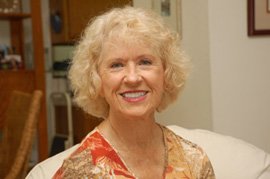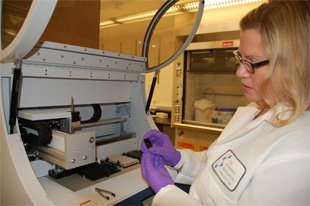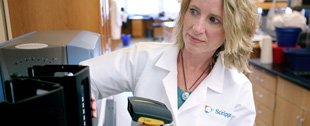Home » Translational Research » Research Highlights » Here
In this section
Healthy Aging
 Do Jerman, among the first volunteers for the Wellderly study, said, “I heard they were looking for healthy 80-year-olds with no medications to put in a gene pool, and I thought, here I am. I’ve done everything I’ve wanted to do in my life and I wanted to do whatever I could to help.”
Do Jerman, among the first volunteers for the Wellderly study, said, “I heard they were looking for healthy 80-year-olds with no medications to put in a gene pool, and I thought, here I am. I’ve done everything I’ve wanted to do in my life and I wanted to do whatever I could to help.”
Wellderly Study: uncovering the genetic secrets of good health
To date, medical research has largely neglected the genetics of good health, instead focusing on finding genetic markers of disease. Through the Wellderly study, researchers seek to understand the mechanisms that help keep people healthy and protected from disease, and to translate key discoveries into improvements in patient care.
“We all carry genes that make us susceptible to diseases, but some of us avoid the major illnesses that afflict others,” said Eric J. Topol, M.D., Director of the Scripps Translational Science Institute and Scripps Genomic Medicine and the study’s principal investigator. “Looking at the genes of healthy elderly people is a unique approach to understanding the underpinning biology of health, and ways this can be inherited.
“A great many people carry the genes that cause heart attack, cancer and other diseases, but some have modifier genes that cancel out their risk – it’s nature’s way of protecting them,” Dr. Topol said. “These so-called ‘wellderly’ are, in fact, harboring the secrets of good health.”
 Becky Tisch transfers multiplexed samples onto a chip for the Wellderly study.
Becky Tisch transfers multiplexed samples onto a chip for the Wellderly study.
While the study will be based in Southern California, participants will also be enrolled in cities across America through Scripps Health‘s relationships with other health care providers.
Locating healthy elderly (80 years of age and older) to get DNA samples is challenging, since they don’t spend much time in health care facilities. Scripps currently attracts volunteers by conducting outreach efforts in the community.
“The logistics are tricky, but we have to find them,” said Dr. Topol. “We think as people learn about this program, they’ll want to participate as a way to help benefit the health and well-being of future generations.”
To Enroll
To determine whether you, a family member or loved one qualify to volunteer for the study, telephone 1-800-SCRIPPS (1-800-727-4777), or e-mail .(JavaScript must be enabled to view this email address) .
For more information:
- Frequently asked questions page on the Scripps Health website.
- “Whole genome sequencing analysis identifies variations between Wellderly & Illderly”
- “Secrets of the ‘Wellderly’: Scientists Hope to Crack the Genetic Code of Those Who Live the Longest,” Wall Street Journal, Sept. 2008
- “Genetic fact-check for aging story,” Nature, August 2008
- KGTV San Diego, 2008
